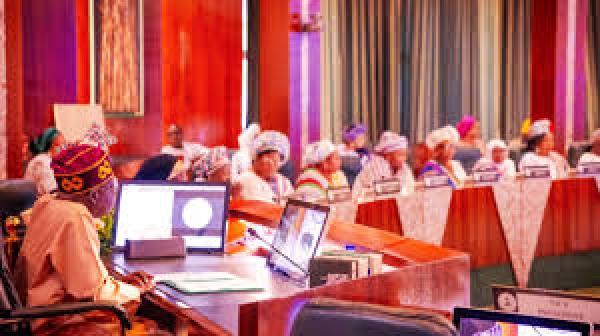One year into his administration, President Bola Tinubu is yet to fulfill the pledges he made on women and youth inclusion in governance and empowerment, an Agora Policy paper has found.
Ahead of the 2023 general election, Tinubu launched an 80-page document on his ‘Renewed Hope Agenda’ for the country.
The 2021-2026 national gender policy mandates 50 percent female representation in political spaces. In his campaign document, Tinubu earmarked a 35 percent slot for women but even this has yet to be met.
Only nine(18.75 percent) of 48 ministerial appointees are women while four females are special advisers.
“Nigeria’s ‘gender character’ cannot continually be overlooked,” Ejiro Otive-Igbuzor, a gender, social inclusion expert and a monitoring and evaluation specialist, wrote in the latest policy paper of Agora, a Nigerian think-tank.
“Just as the ‘Federal Character Principle’ enshrined in the Nigerian constitution provides for fair representation in appointive and elective offices among geopolitical zones, gender character needs to be engraved in laws and policy.
“Women, who comprise 49% of the population and who actively participated in the struggle for democracy, rightfully deserve a seat at the decision-making table. This is the fairness argument.”
NIGERIA’S GLOBAL STANDING IN GENDER EQUALITY
According to the 2023 World Economic Forum (WEF) global gender gap index, Nigeria ranks 130 out of 146 countries, representing a decline from the 2022 ranking of 123.
The Agora Policy paper said Nigerian men also enjoy higher labour participation with most women earning only 50 percent of men’s income, down from 58 percent in 2022.
Otive-Igbuzor said limited access to quality healthcare and social services has further compounded this problem.
Nigeria has one of the highest maternal mortality rates globally, with 1,047 deaths per 100,000 live births. This is a dire situation for millions of women who already grapple with limited access to reproductive healthcare services.
“It is also difficult to identify the concrete things that the administration has done in addressing gender-based violence, promoting STEM education for girls etc,” Otive-Igbuzor wrote.
The gender expert said political will needs to go beyond policies and rhetorics that echo the importance of gender equality and social inclusion (GESI) but must translate to robust fiscal allocations.
Only 0.05 percent of the 2024 budget was allocated to the ministry of women affairs while 9.57 percent of the capital budget was apportioned to the ministry of humanitarian affairs.
“This disparity between promises and resource allocation highlights a systemic challenge in translating expressed commitments into tangible action,” the GESI expert said.
YOUTHS EQUALLY LEFT OUT
The United Nations Population Fund (UNFPA) estimates “that countries in sub-Saharan Africa have the potential to benefit up to $500 billion annually” from demographic dividends for up to 30 years.
Nigerians under 35 years are believed to account for 74.22 percent of the population with the youth population projected to exceed 200 million by 2050.
Experts say the youthful population represents an untapped economic asset. Tinubu had promised to use this as an advantage in his administration.
According to the policy paper, while there is positive action in certain areas, no concrete steps have been initiated in others.
One of the promises the president made was a 30 percent representation of young people in government appointments.
“This promise is yet to be fully redeemed but efforts in this direction are notable,” Otive-Igbuzor said.
“It is noteworthy that promises, efforts, and activities are not results. While the president’s efforts can be applauded, it is important to remember that inclusive policymaking and implementation of existing development policies remain the keys to sustainable development.”
POSITIVE SCORECARD FOR PWD INCLUSION
Assessing the president’s inclusive actions for persons with disabilities (PWDs), Otive-Igbuzor commended Tinubu on his efforts so far.
In 2023, the federal government launched an empowerment programme for PWDs to ensure they gain access to equal opportunities as their abled counterparts.
In November 2023, the president appointed Mohammed Isa as his senior special assistant on disability matters.
Tinubu said Isa’s expertise would enable him to integrate PWD needs into federal policies and programmes as well as collaborate with sub-national authorities.
“The onus is now on civil society, including the PWD community, to advocate and lobby policy implementers for compliance; monitor budget allocations, budget releases, and actual expenditures; and regularly show how well the government is keeping pace with its promises,” Otive-Igbuzor advised.
FULL INCLUSION OF DIVERSE GROUPS FOR ECONOMIC GROWTH
While the GESI expert lauded Tinubu for his efforts in improving inclusion, she noted that more can be done.
Otive-Igbuzor urged the president to fulfil his promise of 35 percent affirmative action for women and to effectively engage the country’s youthful workforce as part of the 30 percent inclusion pledge.
The monitoring and evaluation specialist also called for the prioritisation of PWDs and the involvement of sub-nationals to promote active ownership and coordination in implementing the country’s development plan.
“Beyond the ‘right speak’, concrete actions and accountability are crucial to ensure meaningful progress and full participation of marginalised groups in governance, and to ensure that no one is truly left behind by 2050,” she said, noting the importance of stronger political will.
Otive-Igbuzor said the failure of the president to prioritise these issues puts him at risk of repeating past failures.
[TheCable]

